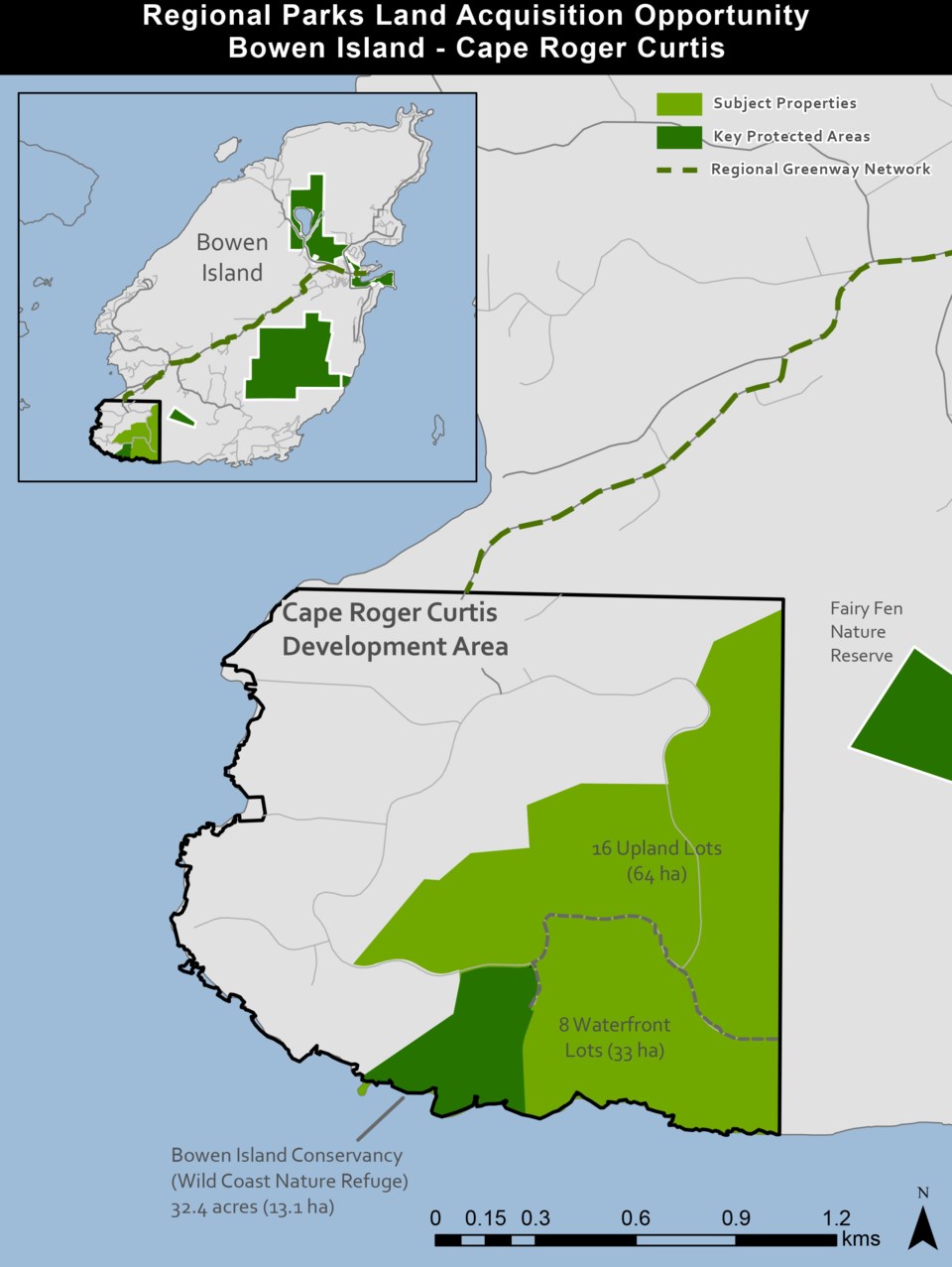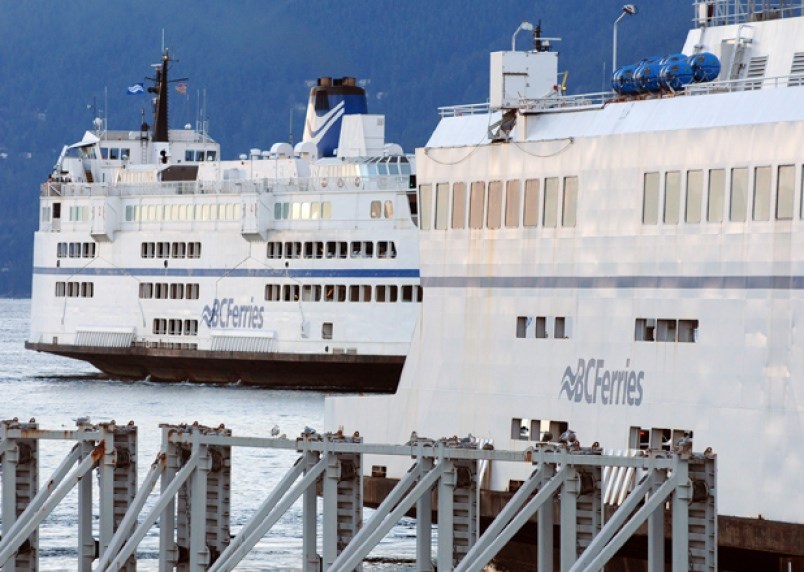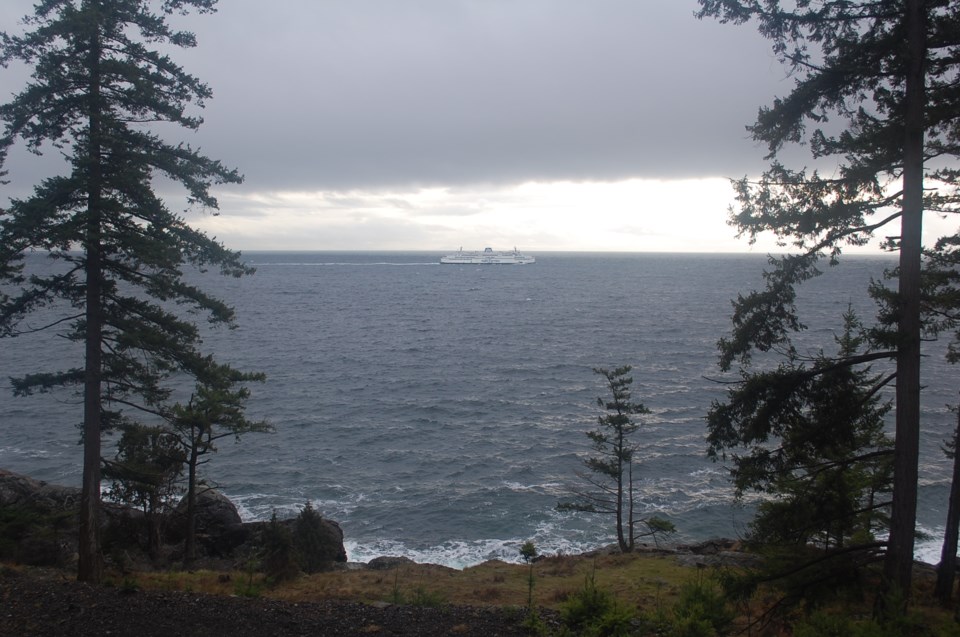A proposed plan to establish a new Metro Vancouver park has divided on- and off-island residents and raised questions over whether it will gain enough support to go forward, the Regional Parks Committee heard Wednesday.
Last year, Metro Vancouver said it would put up $40 million to establish a park at Bowen Island's Cape Roger Curtis. The 97-hectare park would boast 700 metres of waterfront along a coastline where visitors have increasingly spotted killer and humpback whales.
The proposed plan would also preserve several sensitive landscapes — including a coastal bluff ecosystem of arbutus and Douglas firs, some up to 400 years old — offer options for day visits and see up to 100 overnight campgrounds.
But local opposition to the park has raised concerns Metro Vancouver's plans could get derailed before they get off the ground.
A public engagement phase carried out in February and March 2023 found almost half of the nearly 2,400 respondents said they supported the creation of the new park. Big divides emerged between those who lived on and off island.
Eighty-five per cent of respondents living off Bowen Island said they supported a new park. But support dropped to 19 per cent among Bowen Island residents, with 57 per cent opposing its creation.
"We've run into unexpected opposition," said David Hocking, a former Bowen Island municipal councillor. "But despite that, many of us remain convinced that this park is exactly what Metro Vancouver and Bowen need."
"So I'm asking you to recommend that the board of Metro Vancouver completes the acquisition of Cape Roger Curtis Regional Park."

Residents raise concerns over traffic, ferries and wildfires
Some of the concerns shared with the regional body cited a lack of ferry capacity, the impacts an increase in visitors could have on wildfires and street use, and the protection of sensitive ecosystems.
The report said transportation was the biggest concern of island residents. Many wanted to understand the potential traffic impacts better, both on-island and with ferry traffic, noted the report submitted to Metro's Regional Parks Committee Wednesday.
Others called for a park shuttle as an alternative form of transportation and for Metro to support hikers, bikers and paddle-in camping.
The creation of the park also faces several local hurdles. Next week, Bowen Island's municipal council will receive draft bylaws from staff to allow for overnight camping on the 97-hectare site. The land — currently zoned Rural Residential 1 — is ready to accommodate a park but needs sign-off from the municipality to amend the island's Official Community Plan and Land Use Bylaw and reclassify it as a park where camping can occur.
Some Metro directors openly worried that local opposition to the park could be insurmountable.
"What really concerns me is that our own survey shows that of the Bowen Island residents, there's only 19 per cent support," said Coquitlam Coun. Craig Hodge.
"Now that appears to be growing. I don't know if it's going to grow in time."
Metro staff said getting critical feedback is part of the public consultation process to make a park that works for everyone.
Social media amplified concerns, say some community members
Several speakers at the committee meeting said opposition to the park was amplified by disinformation shared on social media.
In the lead-up to several Metro open houses, Bowen Island mayor and committee member Andrew Leonard described fear climbing to a "fever pitch."
"In the past 35 years, this is totally unprecedented on Bowen. So it's understandable that without a viable transportation plan for the park use yet in place that this has amped up the anxiety," said musician and Bowen Island resident Shari Ulrich.
"But the irony is not lost on me that the most powerful antidote to the fear and anxiety in these times is a nice walk in the woods."
Describing the creation of the new regional park as another safety valve against a mental health crisis, rising overdose rates and "a generation of youth that is living their lives on screens," Ulrich called on all those involved to "remain dedicated to the bigger picture and the greater good."
Speaking outside of his official capacity as a Bowen Island councillor, Tim Wake said the process has bred "fear" among residents who haven't been given enough information. He said whether a park goes in or not, the island will face challenges with traffic.
"We've already got pretty much all the tourism we can handle," said Wake, who supports the park's creation. "But the success of our tourism is really going to depend on our ability to create a destination sustainable destination tourism."
Like many communities, Wake said that's where the multi-use paths and e-bikes come in.

Councillor apologizes, says she will work with Metro push park forward
Bowen Island councillor Judith Gedye apologized to staff for a March 2, 2023, op-ed in the Bowen Island Undercurrent in which she criticized the chair and vice-chair of the Metro Vancouver board.
"I do understand I created a problem. We got off on the wrong foot," Gedye told the committee.
District of North Vancouver Coun. Lisa Muri said many of the fears facing Bowen Island residents — from traffic and speeding to environmental impacts — were facing communities across the region. She told Gedye Metro Vancouver can be one of Bowen Island's "best allies" in tackling those issues.
No Bowen residents who opposed the park spoke before the committee. However, several written submissions raised concerns, including a "triple-bottleneck" running through the Horseshoe Bay ferry terminal, the ferry route and the small cove where visitors and returning residents are forced to transit.
"Everything that happens on this island affects us all, and we exist in extreme dependence on that little bottleneck. If it doesn't function, we don't function," wrote Bowen Island resident Marian Bantjes in a letter submitted to the Metro Parks Committee.
"It's a weird situation to be in: 'fighting against a park,'" Bantjes added. "But what I want you to understand very clearly is that none of us are fighting against a park—we are fighting to preserve the viability of our community as a place to live, raise children and, for those who need to, commute to the city for work. We are fighting for both a natural ecosystem and a human one."
Phase 2 of the park is slated for this spring and summer when Metro will draft park concepts and integrate feedback. Phase three is scheduled to start in the fall and will lead to a final park plan.
With files from Alex Kurial



